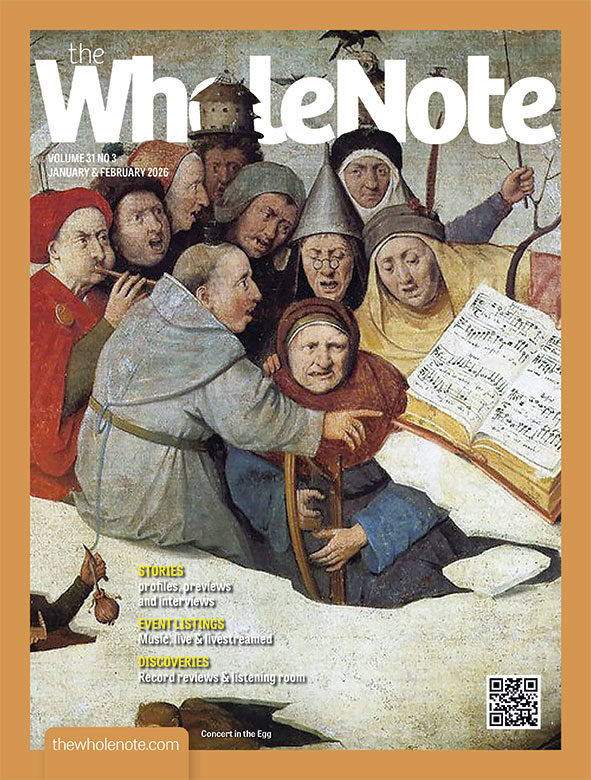October has arrived with a burst of energy. The musical floodgates of Toronto and Southern Ontario have opened, and so there are close to 500 listings in this issue of The WholeNote. This is an annual occurrence – a predictable aspect of the seasonal nature of the music business. But it’s also a reflection of the depth of our musical life.
This depth is reflected, in varous ways, in this month’s magazine. Our two feature articles highlight what might be called the opposite ends (early and new) of the classical music spectrum: Opera Atelier, and composer John Beckwith. Yet both are uniquely products of this time and place.
Opera Atelier, one of the few “period” opera companies in the world, has a strong commitment to the predominantly Canadian singers, instrumental musicians and other artists who bring the company’s productions to life. And Beckwith has always been proudly Canadian in his compositional interests, and also in his books and essays on musical subjects. As well, he was a prolific producer of other composers, through his many years as a professor at the University of Toronto. (I’m honoured to number myself among his students.)
What else does the October 2010 WholeNote say about the musical life of Toronto? As always, we cover the full range of musicianship – from accomplished professionals in the fields of classical, jazz and world music, to enthusiastic amateurs who sing in choirs and play in community ensembles. This is reflected not just in our listings, but also in the 175 entries in this year’s Blue Pages, our annual directory of musical presenter profiles. (Eighteen of them actually have names that begin with the word “Toronto.”)
One sub-theme that’s apparent in this particular issue of the magazine is the ongoing blurring of the distinction between what’s “classical” and what isn’t. Personally, I have mixed feelings about this phenomenon – but, at its best it can be a healthy sign of artistic renewal and growth. Simone Desilets, in her “Early Music” column draws attention to a new group, Ensemble Vesuvius, which brings a historically informed approach to the performance of Sicilian folk music. Similarly, Jason van Eyk, who writes our “In With the New” column, talks about “X-Avant,” the Music Gallery’s category-bending festival of contemporary music.
Another sub-theme that emerges is the presence of competitions in our musical life. Allan Pulker, in his “Classical & Beyond” column notes that the first- and second-place winners of this year’s Banff International String Quartet Competition – the Cecilia and Afiara Quartets, respectively – are both Canadian groups. And both will be playing concerts in Toronto in October. Pulker also mentions a new event, the Chinese Cultural Centre of Greater Toronto’s International Piano Competition (which takes place from November 1-8). The CCCGT has put together an impressive jury chaired by Yoheved Kaplinsky of the Juilliard School – and there’s $28,000 in prize-money to be won.
To this, I’d like to add a mention of another competition, of sorts: the annual Toronto Arts Foundation Awards. Included in this year’s finalists are a number of musicians: composer Constantine Caravassilis, conductor Lydia Adams, and Andrew Burashko’s Art of Time Ensemble; as well as José Ortega, Artistic Director of Lula Music and Arts Centre. Winners are announced on October 8 – and I hope they all win.




